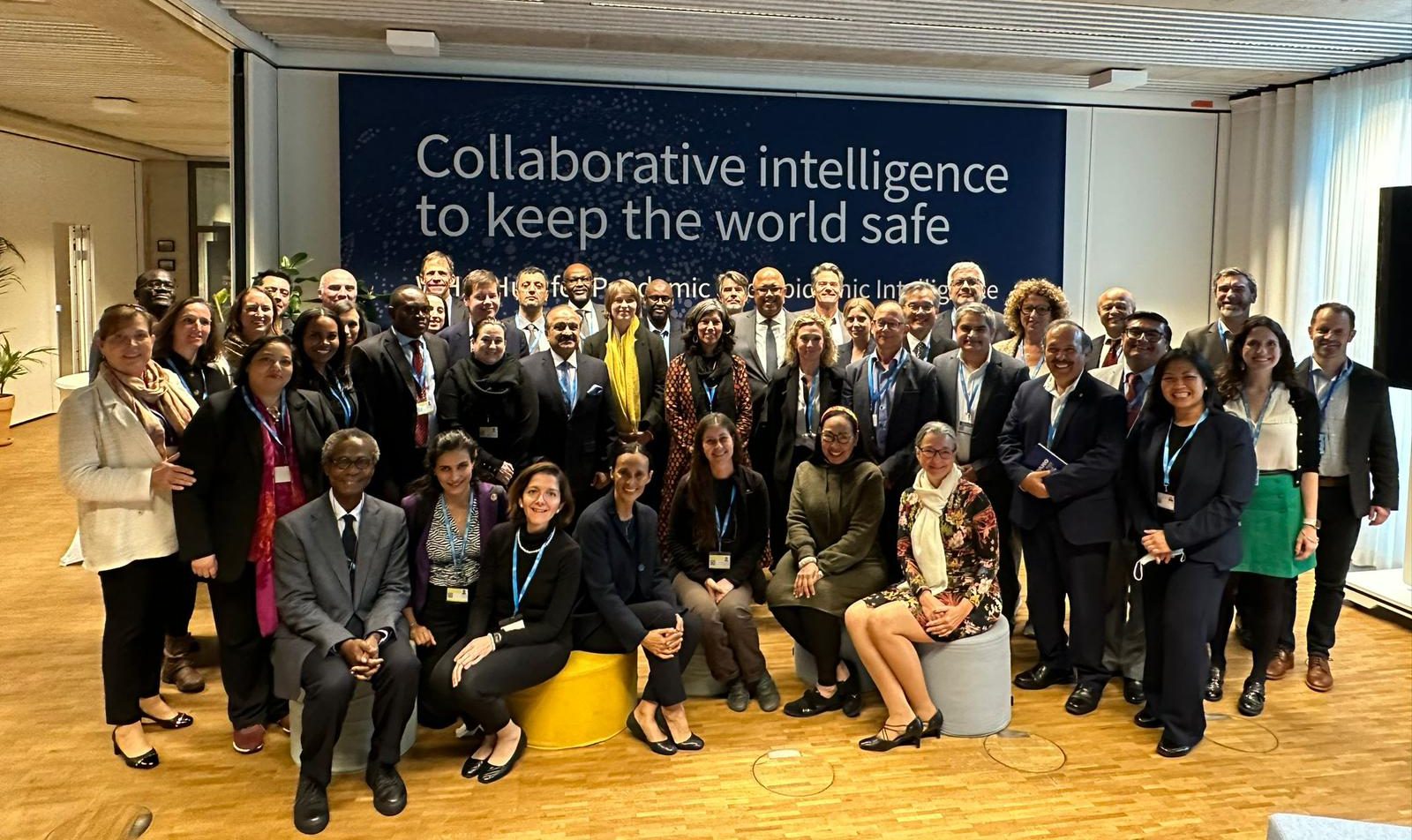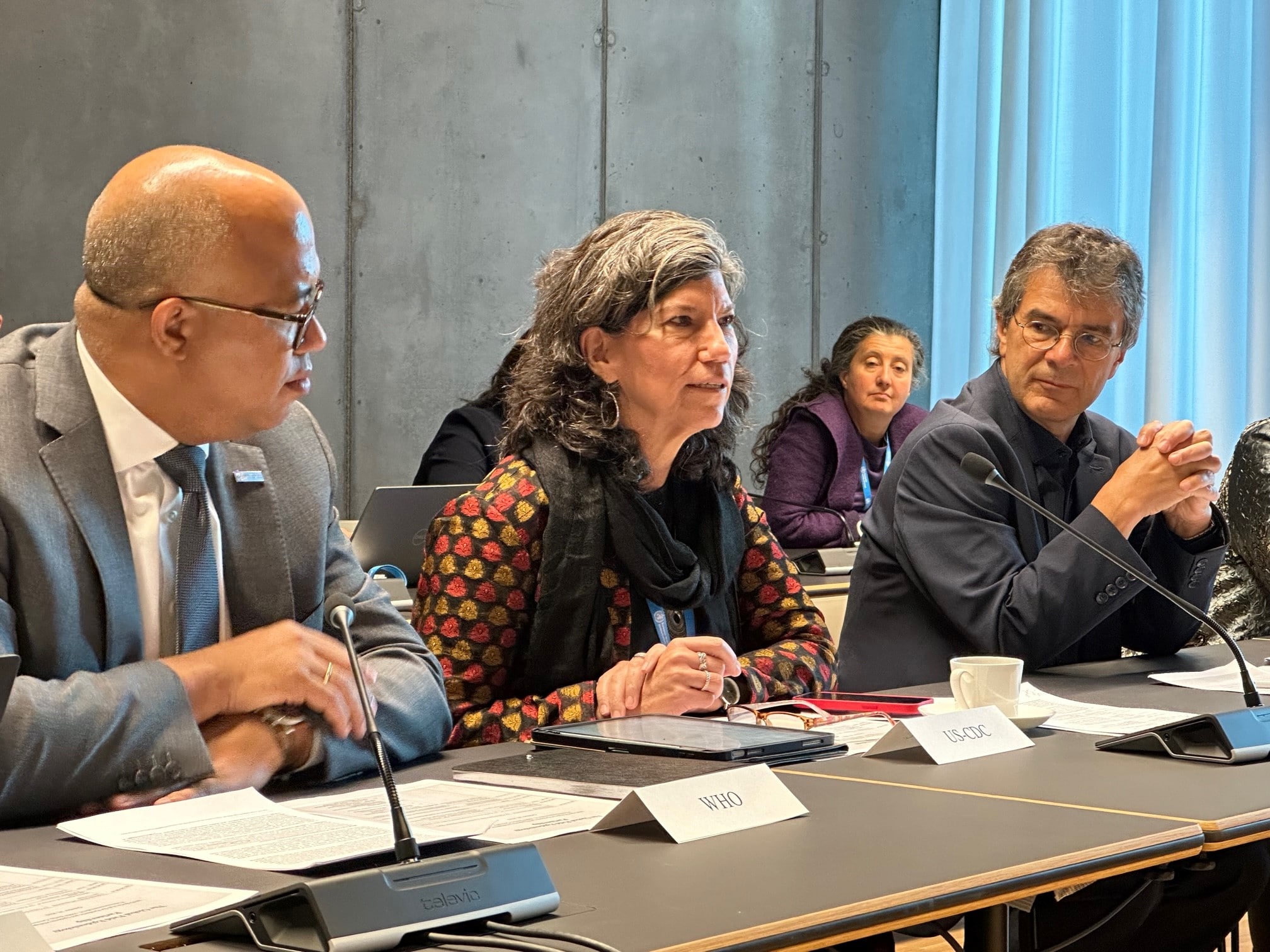Establishment and Launch of Global Field Epidemiology Partnership Aims to Strengthen Public Health Workforce and Enhance Global Health Security

CDC collaborates with partners to launch the Global Field Epidemiology Partnership (GFEP). Photo: WHO
On October 18, 2023, a diverse and inclusive collaborative of more than 30 global health partners launched the Global Field Epidemiology Partnership (GFEP), to better align and improve efforts to strengthen the field epidemiology workforce and institutions that support them. The launch took place at the WHO Hub for Pandemic and Epidemic Intelligence immediately following the World Health Summit in Berlin. The meeting was co-chaired by Dr. Chikwe Ihekweazu, Assistant Director-General of WHO’s Division of Health Emergency Intelligence and Surveillance Systems, and Dr. Kayla Laserson, Director of the U.S. Centers for Disease Control and Prevention’s (U.S.CDC) Global Health Center.
The GFEP includes multilateral and bilateral organizations, academic institutions, nongovernmental organizations, Field Epidemiology Training Programs (FETPs), regional and alumni networks, and national public health institutes from low-, middle- and high-income countries across every continent. The strong interest across many partners and countries demonstrates the critical importance of field epidemiology training for pandemic preparedness and response, addressing high-burden public health challenges and strengthening public health systems.
“For over 40 years, CDC has provided unwavering support for the growth and development of FETPs and the FETP Enterprise, which laid the groundwork for the launch of the Global Field Epidemiology Partnership (GFEP),” said Kayla Laserson, ScD, SM, FASTMH (CDR, USPHS, RET). “I am a firm believer in the African proverb – ‘If you want to go fast, go alone. If you want to go far, go together.’ The launch of the Global Field Epidemiology Partnership has been decades in the making and serves as a nexus where diverse stakeholders can unite to advance field epidemiology globally. CDC is committed to working with partners and the wider global community to fortify the capacity-building infrastructure for field epidemiology, protect communities, and enhance global health security together.”
One of the first deliverables of GFEP will be to map all partners’ activities relevant to field epidemiology and to develop a regularly updated dashboard, which can help coordinate all activities to eliminate overlaps and gaps. Additionally, GFEP will support activities under two thematic domains: 1) scaling up quantity and improving the quality of field epidemiology workforce development programs, and 2) supporting activities aimed at strengthening national health systems’ components that have direct relevance to field epidemiology, such as surveillance, health information, laboratory, and primary healthcare.
Program institutionalization and mentorship development were priorities identified in the meeting as challenges that GFEP aims to address. GFEP can bring together public health partners that have successful institutionalization or mentorship development models from other disciplines. One meeting participant noted that GFEP can help bridge geographic and programmatic divides that currently keep us from fully realizing goals for field epidemiology capacity development.

Dr. Ihekweazu, and Dr. Kayla Laserson, co-chairing GFEP launch meeting in Berlin, Oct. 18, 2023. Photo: WHO
“GFEP fills an important gap in the global health architecture,” said George Shakarishvili, Director of Strategic and Technical Initiatives at TEPHINET, a program of The Task Force for Global Health. “It aligns field epidemiology stakeholders with partners supporting national health sector and broader public governance ecosystem at the county level, as such, helps integrate field epidemiology and disease surveillance into the multi-sectoral environment in low- and middle-income countries.”
A governance model was proposed with U.S. CDC and WHO co-chairing the GFEP Steering Committee, and with WHO and TEPHINET co-hosting the GFEP Secretariat.
“The Global Field Epidemiology Partnership (GFEP) represents the next step in reinforcing field epidemiology training programmes (FETPs). The World Health Organization recognizes the important role that field epidemiologists played during the COVID-19 pandemic as critical players in the management of infectious disease outbreaks. However, FETPs remain largely unrecognized and underfunded. GFEP intends to bring together a wide range of partners from national and regional FETPs, national public health institutes, bilateral and multi-lateral organizations, academia, non-profits and philanthropy to coordinate, align, and amplify their individual abilities to strengthen field epidemiology capabilities and expand the implementation of FETPs globally,” said Dr. Ihekweazu.
The first deliverable under the GFEP umbrella was announced at the Berlin meeting by one of the GFEP partners, Asia-Pacific Consortium of Veterinary Epidemiology (APCOVE). APCOVE developed a training package on veterinary field epidemiology comprised of 36 eLearning modules across six competency domains. GFEP will facilitate partner connections so that the training package can be implemented in other regions, not covered by APCOVE. This kind of collaboration will help increase awareness and support for development of veterinary field epidemiology capacity in a cost-effective and sustainable way.
The next step is to develop the charter, define terms of reference, and form a Steering Committee. The Steering Committee will oversee the development and approval of GFEP’s strategy and work plan, allowing the partnership to start implementation in 2024.
We invite governmental and nongovernmental organizations interested in becoming a GFEP partner to contact, George Shakarishvili, gshakarishvili@taskforce.org. For more information on Training Programs in Epidemiology and Public Health Interventions Network (TEPHINET) program, click on this link.